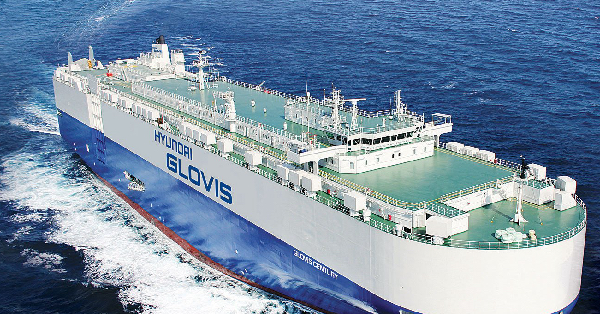Vehicle carrier GLOVIS SUNRISE becomes the first Korean-flagged PCTC vessel to sail on biofuels, as sustainable “drop-in” fuel takes centerstage in Hyundai GLOVIS’ sustainability strategy
GoodFuels, the leading biofuels provider for the global transport industry, has announced the successful completion of a first biofuel bunkering in collaboration with Hyundai GLOVIS, a global total logistics and distribution company. The bio-bunkering is the first for a Korean-flagged PCTC (Pure Car and Truck Carrier) vessel and marks a new milestone for Hyundai GLOVIS as biofuels take a central role in the company’s sustainability strategy.
The vehicle carrier GLOVIS SUNRISE was refuelled with 500 MT of GoodFuels’ sustainable biofuels blend MDF1-30 during a port visit to Vlissingen (Flushing), in the Netherlands, on 28 December 2022. The trial took place during the vessel’s voyage between Europe and the Persian Gulf, ending in late January.
GoodFuels’ next-generation sustainable biofuel is produced from feedstocks that are certified as 100% waste or residue, including processed used cooking oil and animal waste fats. It delivers a well-to-exhaust CO2 reduction of 80 to 90 percent when compared to its fossil fuel equivalent. Thanks to its “drop in” properties, the biofuel was delivered to and consumed by the GLOVIS SUNRISE without requiring any modifications to the engine or tanks.
This successful bio-bunkering demonstrates Hyundai GLOVIS’ commitment to deliver low-carbon transport solutions and is part of its global sustainability strategy. The company is committed to reducing greenhouse gas emissions from its fleet of 153 vessels, improving its capabilities for green logistics and expanding the utilization of sustainable and renewable energy sources.
Dirk Kronemeijer, CEO of GoodFuels, said: “This first bio-bunkering in collaboration with Hyundai GLOVIS marks an exciting milestone towards decarbonised maritime transport and more sustainable supply chains. It also shows the central role that biofuels can play in reducing shipping’s carbon footprint today, as a safe, convenient and technically viable option to slash emissions from commercial vessels by up to 90%.
“We are delighted to see biofuels being adopted as a decarbonisation solution in more regions of the world, as this first bio-bunkering for a Korean vessel demonstrates. The climate emergency demands action now, and we are glad to be working with pioneers like Hyundai GLOVIS who are walking the talk of sustainable transport with concrete action.”
Commenting on this first bio-bunkering Tae-Woo KIM, Senior Vice President, Head of Shipping Business Division, at Hyundai GLOVIS said: “In a fast-evolving business environment, we are committed to continuously innovate to deliver greater sustainability across our logistics and shipping activities. This means exploring a number of options to decarbonise our fleets, today and in the future. As we strive to provide efficient and sustainable maritime transportation to global automotive manufacturers, including Hyundai Motor Group, Kia, and Volkswagen, we are delighted to see the results of this biofuels trial, which shows that tangible emissions reductions can be achieved today on existing fleets. Biofuels will also play a key role in our future strategy, as we continue to develop a maritime transportation system tailored to the green supply chains of the future.”









































